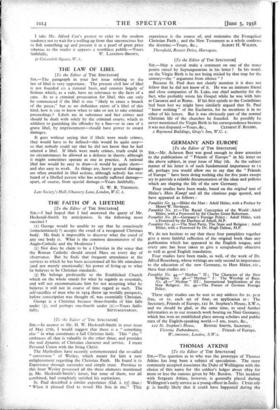THE LAW OF LIBEL
[To the Editor of THE SPECTATOR] SIR,—The paragraph in your last issue relating to the law of libel is very opportune. The present civil law of libel is not founded on a rational basis, and consists largely of fictions which, as a rule, have no relevance to the facts of a case. As to a criminal prosecution for libel, this can only be commenced if the libel is one " likely to cause a breach of the peace," but as no definition exists of 'a libel of this kind, how is one to know when to take or not to take criminal proceedings ? Libels are in substance and fact crimes and should be dealt with solely by the criminal courts, which in addition to punishing the offender by a fine—or in case of a grave libel, by imprisonment—should have power to award damages.
It goes without saying that if libels were made crimes, they would have to be defined—this would be quite easy— so that nobody could say that he did not know that he had uttered a libel. If libels were made crimes, truth could in no circumstances be allowed as a defence in theory, although it might sometimes operate as one in practice. A rational libel law would be easy to draw—it would be quite short— and also easy to work. As things are, heavy general damages are often awarded in libel actions, although nobody has ever heard of a libelled person who has actually suffered damage— apart, of course, from special damage.—Yours faithfully,
G. W. R. THOMSON.
Law Society's Hall, Chancery Lane, London, W.C. 2.


















































 Previous page
Previous page